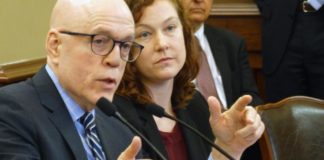
I woke up Tuesday with a queasy feeling in my stomach and a mental list running through my head of everything I needed to do – including fighting for my basic rights. As a queer person with a uterus, my anxiety was at an all time high thinking that people could ever vote against my existence as a human. Over the course of the past two years, blatantly homophobic politicians like Ron DeSantis, the Republican governor of Florida, and questions over the constitutionality of abortion somehow made their way onto the 2022 midterm election ballot. Not knowing whether my rights to bodily autonomy or to exist as a queer person would be in tact when I woke up after Election Day left me physically and emotionally drained.
In March, DeSantis – who was reelected by a margin of nearly 20 points Tuesday night – signed the “Don’t Say Gay Bill” into state law. Florida and five other states prohibit the discussion of sexuality and gender identity in kindergarten through third grade. I often think about how meaningful it would have been for the younger version of myself to see or know a non-binary person – I didn’t even know about transgender people until the age of 15.
Outlawing conversations about sexuality and gender identity means children fail to learn about labels they could possibly identify with, and others could remain ignorant and disrespectful to my existence. I often exist in spaces where I am the only non-binary person, and I’m forced to explain my gender identity to those who don’t understand and correct people when they misgender me. Sometimes I get called a “they/them” or “girl” despite explaining over and over again that they/them are just my pronouns and I am non-binary. If education existed at a younger age about the LGBTQ+ community, more people would grow up to understand the correct language for respecting and talking about me.
Prohibiting the discussion of queer people is also inherently homphobic because it implies there is something inappropriate about our existence. Due to how taboo discussions surrounding the LGBTQ+ community are, it took me a long time to not be ashamed of my queerness. And no one – especially government officials – should tell a child that their sexuality and gender identity is too inappropriate to discuss. All children deserve a safe place to explore who they are and receive support and celebration for simply being a human.
My heart sank when I saw the votes for DeSantis come in until he secured his reelection, and some news outlets even predict he will run for president. The thought of a DeSantis presidency makes me panic – U.S. Supreme Court Justice Thomas Clarence has already signalled his willingness to reconsider gay rights, setting the stage for politicians to outlaw my right to marry who I love.
When the Supreme Court’s conservative majority overturned Roe v. Wade in June, a pit grew in my stomach similar to the one on Election Day and when DeSantis codified the “Don’t Say Gay” bill. Four cisgender men and one cisgender woman overturned my right to an abortion despite the fact that more than 60 percent of the United States population supports legalizing abortion in all or most cases in 2022.
Reproductive justice remains at the forefront of my concerns after the Supreme Court’s conservative majority decision. I already struggle to access adequate health care as a gender queer person, and ripping my right to an abortion away only exacerbates that struggle. While I never needed an abortion in the past, people who can get pregnant share that abortions saved their lives, and I cannot guarantee that I won’t need one in the future. Access to abortions is essential, life saving and necessary, so I remain deeply concerned for my life, the lives of many people who I love and every other person that could need an abortion.
I voted “Yes” on Proposition 1 to amend the California constitution to include the right to abortion which passed with overwhelming support. In Vermont and Michigan, voters amended their state constitutions as well to protect people’s reproductive freedom while Kentucky voters rejected a ballot measure aimed at denying any constitutional protections for abortion.
Thankfully, some election results caused happy tears and not sad ones. Maura Healey, a Democrat, became the first openly out lesbian governor in the United States after winning her race for governor of Massachusetts. As a queer person who was socialized as a woman and is entering the world of politics, Healey represents everything I ever want to accomplish – creating change while embracing my queerness, not as my entire identity but as a means to stand up for others and also be proud.
James Roesener, a Democrat running for office in New Hampshire, also became the first ever transgender man elected to a United States state legislature in history, showing the transgender community that they are able to lead our country despite running alongside transphobes. As a gender queer politician who is affected by abortion access, I see a lot of myself in Roesener and feel safe knowing that he will fight to protect the rights of people that are queer and can get pregnant.
The feeling of immense fear as my rights lie in the hands of people who will never understand my existence is inherent to who I am, but the culmination of Election Day truly exacerbates those feelings to a level of gut wrenching anxiety. Respect for my sexuality, gender identity and own body is the bare minimum, and to watch them debated on a national level is exhausting beyond anything I have ever experienced. While I’m ecstatic to see openly lesbian women and transgender men trailblazing what will hopefully be my own path into politics, I am scared of the threat that people like DeSantis pose to my ability to live as myself.
Riley Goodfellow, a sophomore majoring in political science, is the contributing opinions editor.
This article appeared in the November 10, 2022 issue of the Hatchet.








